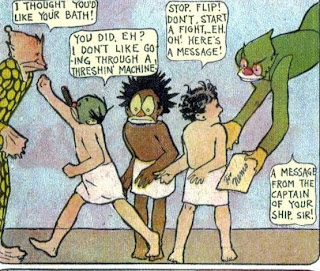I've never seen a single episode of The Donna Reed Show (1958-1966). It was before my time, and it hasn't been rerun often. Apparently not a lot of people were watching in the early 1960s. Like other nuclear family sitcoms, such as Ozzie and Harriet and Leave It to Beaver, it barely hit the top 30, regularly being trounced by Westerns (Gunsmoke), medical dramas (Dr. Kildare), and reality tv (Candid Camera).
But the squeaky-clean suburban sitcom left a lasting legacy: Paul Peterson, aged 13 to 21, played Donna's dreamy teenage son, Jeff. I don't know if his character was portrayed as girl-crazy or not during the later seasons, but the teen magazines seemed oddly obsessed with pushing him into girls' arms.
In the shirtless shots, he is almost always shown with a girl -- even if that girl is his little sister, and he's reading to her in pajamas. What were they trying to prove?
Paul had the clean-cut handsomeness beloved in 1950s teen idols, and a dreamy voice, so he began recording songs in 1962: "Keep Your Love Locked," "Lollipops and Roses"; "She Can't Find Her Keys." Before long he released five albums and contributed to a sixth. His biggest hit, "My Dad," was, of course, a paeon to his real-life father, with no girls mentioned.
 After Donna Reed, Paul continued to perform, acted occasionally, and published a series of novels about a macho adventurer named The Smuggler. His most enduring legacy came in 1990, when he founded A Minor Consideration, dedicated to improving the working conditions for child actors and helping them transition to adulthood.
After Donna Reed, Paul continued to perform, acted occasionally, and published a series of novels about a macho adventurer named The Smuggler. His most enduring legacy came in 1990, when he founded A Minor Consideration, dedicated to improving the working conditions for child actors and helping them transition to adulthood.While no one would deny that this is a praiseworthy goal, and there are no specifically homophobic statements on his website, there is also not a word about gay child actors in a heterosexist workplace -- not one word -- and the editorials veer uncomfortably toward exclusionary family values" rhetoric.
See also: Beefcake Dads of 1950s Sitcoms










